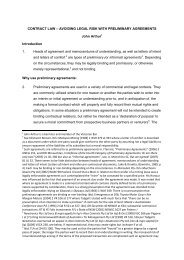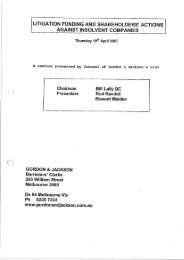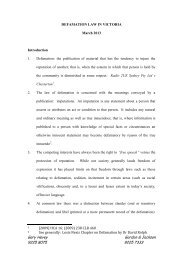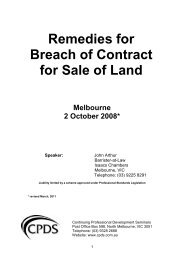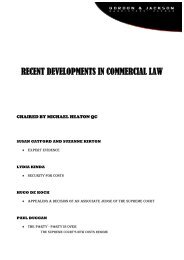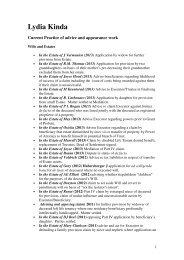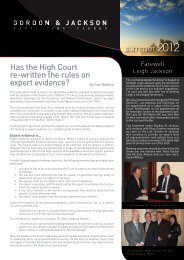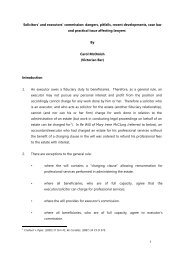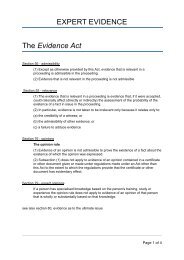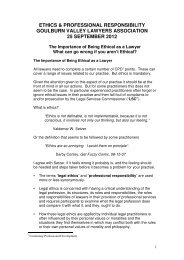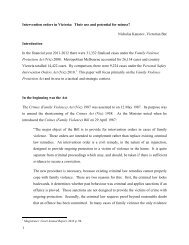Enforcing Rights & Remedies under a Contract for the Sale of Land
Enforcing Rights & Remedies under a Contract for the Sale of Land
Enforcing Rights & Remedies under a Contract for the Sale of Land
Create successful ePaper yourself
Turn your PDF publications into a flip-book with our unique Google optimized e-Paper software.
3.5.1 A right <strong>of</strong> rescission or termination will be available to <strong>the</strong> innocent<br />
party if <strong>the</strong> o<strong>the</strong>r party repudiates <strong>the</strong> contract. This will invariably<br />
involve a breach <strong>of</strong> condition as discussed in section 3.1 above.<br />
3.5.2 If one party by words or by conduct evinces an intention no longer to<br />
be bound by <strong>the</strong> contract (ei<strong>the</strong>r by refusing, or being unable, to<br />
per<strong>for</strong>m <strong>the</strong> contract or an essential term <strong>the</strong>re<strong>of</strong>), he or she<br />
repudiates it, which gives <strong>the</strong> o<strong>the</strong>r party <strong>the</strong> right (or election) to<br />
accept <strong>the</strong> repudiation and rescind (or terminate) <strong>the</strong> contract 50 .<br />
3.5.3 In <strong>the</strong> context <strong>of</strong> contracts <strong>for</strong> <strong>the</strong> sale <strong>of</strong> land, <strong>the</strong> vendor's obligation<br />
is to deliver a good title and <strong>the</strong> purchaser's obligation is to pay <strong>the</strong><br />
price. These are concurrent and mutually dependent obligations in <strong>the</strong><br />
absence <strong>of</strong> any provision in <strong>the</strong> contract to <strong>the</strong> contrary. If one party<br />
in<strong>for</strong>ms <strong>the</strong> o<strong>the</strong>r that it cannot, or will not, complete <strong>the</strong> contract by<br />
settlement date, he or she commits an anticipatory breach amounting<br />
to a repudiation which gives <strong>the</strong> innocent party a right to terminate.<br />
3.5.4 Presented with repudiatory conduct <strong>of</strong> <strong>the</strong> guilty party, <strong>the</strong> innocent<br />
party has an election to ei<strong>the</strong>r refuse to accept <strong>the</strong> repudiation and<br />
continue to require per<strong>for</strong>mance, or accept <strong>the</strong> repudiation and bring<br />
<strong>the</strong> contract to an end. There is some high authority <strong>for</strong> <strong>the</strong><br />
proposition that communication <strong>of</strong> <strong>the</strong> acceptance <strong>of</strong> <strong>the</strong> repudiation<br />
is not strictly necessary 51 .<br />
3.5.5 If <strong>the</strong> contract is thus “rescinded”, or discharged, it is ended only<br />
ins<strong>of</strong>ar as future per<strong>for</strong>mance is concerned and remains “live” <strong>for</strong> <strong>the</strong><br />
awarding <strong>of</strong> damages <strong>for</strong> prior breaches including <strong>the</strong> breach which<br />
constituted <strong>the</strong> repudiation.<br />
50 eg. Holland v Wiltshire (1954) 90 CLR 409 at p. 420 per Kitto J; Nund v McWaters [1982] VR 575 (FC);<br />
Carr v JA Berriman Pty Ltd (1953) 89 CLR 327 per Fullagar at 351-352 and <strong>for</strong> a recent example in <strong>the</strong><br />
Victorian context see, McRae v Bolaro [2000] VSCA 72)<br />
51 The acceptance <strong>of</strong> a repudiation is manifested by "so acting as to make plain that in view <strong>of</strong> <strong>the</strong><br />
wrongful action <strong>of</strong> <strong>the</strong> party who has repudiated, [<strong>the</strong> innocent party] claims to treat <strong>the</strong> contract as at<br />
an end": Heyman v Darwins Ltd [1942] AC 356; [1942] 1 All ER 337, Viscount Simon LC at 361 (AC); Ryder<br />
v Frohlich [2004] NSWCA 472, McColl JA at [117] (Hodgson and Ipp JJA agreeing); Cooper v Kinsella [2011]<br />
NSWCA 45, Hodgson JA at [52]–[54] (Allsop JA agreeing, Sackville AJA disagreeing on <strong>the</strong> application <strong>of</strong><br />
<strong>the</strong> principle to <strong>the</strong> facts) cited in Thomson Laws <strong>of</strong> Australia at TLA [7.6.595]; Holland v Wiltshire at p.<br />
416 per Dixon J: vendor’s "election to treat <strong>the</strong> contract as discharged by <strong>the</strong> purchasers’ breach was<br />
sufficiently manifested by his proceeding to advertise <strong>the</strong> property <strong>for</strong> sale, and by his selling it"; Poort v<br />
Development Underwriting (Vic) Pty Ltd [No. 2] [1977] VR 454 (FC) and see, ibid, TLA [7.6.595]<br />
10



